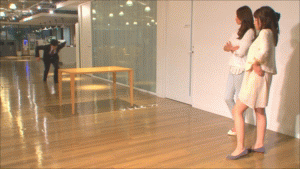Categories:
- Greetings
- Introductions
- Courtesy (Giving thanks | apologizing)
- Asking for help from strangers
- Medical Emergencies
- School
- Work
- Talking about family
- Romantic / Personal
![]() Quick Tip:
Quick Tip:
Make the most of your Japanese learning! There is a free useful chrome extension called “rikaikun” that you can add on to your browser in order to translate any Japanese character you hover over on this page. Once installed, simply hover over any Japanese character and a pop-up translation will appear. This is a great tool help speed your Japanese reading skills!
Click here to download the ‘rikaikun’ extension safely through chrome.
 Greetings
Greetings

おはようございます。
ohayou gozaimasu.
Good morning.
Phrase breakdown:
- ohayou = good morning
- gozaimasu = to be,exist
![]() In casual speech, the “gozaimasu” is dropped and only “ohayou” is said. Saying “ohayou” is like saying “mornin’ in English as opposed to “good morning”.
In casual speech, the “gozaimasu” is dropped and only “ohayou” is said. Saying “ohayou” is like saying “mornin’ in English as opposed to “good morning”.
こんにちは。
konnichiwa.
1. Hello. | 2. good afternoon.
Phrase breakdown:
- kon = the current …; this
- nichi = day
- wa = particle that marks the topic of the sentence (Roughly means: as for, speaking of)
![]() With this commonly used expression, one is literally saying “Speaking of this day….”. It does sound quite funny and odd when you look at it literally, but just remember that it is is used as a daytime greeting. Also note that ‘konnichiwa’ can mean “Hello.” or “Good afternoon.”
With this commonly used expression, one is literally saying “Speaking of this day….”. It does sound quite funny and odd when you look at it literally, but just remember that it is is used as a daytime greeting. Also note that ‘konnichiwa’ can mean “Hello.” or “Good afternoon.”
こんばんは。
konbanwa.
Good evening.
Phrase breakdown:
- kon = the current …; this
- ban = evening
- wa = particle that marks the topic of the sentence (Roughly means: as for, speaking of)
![]() This is a formal greeting used in the evening. It is okay to use this expression from 5pm to 12am.
This is a formal greeting used in the evening. It is okay to use this expression from 5pm to 12am.
さようなら。
sayounara.
Good bye. | Farewell.
Phrase breakdown:
- sayou = like that
- nara = if
![]() “sayounara” is the most polite form of saying goodbye. It’s mostly
“sayounara” is the most polite form of saying goodbye. It’s mostly
reserved for when departing for a significant amount of time. If
you will most likely see the person the next day or relatively soon do not use “sayounara”, instead, use the formal phrase “dewa mata ashita. = See you tomorrow.”
はじめまして。
hajimemashite.
Nice to meet you.
Phrase breakdown:
- hajimemashite = derived from the verb “hajimeru (to begin, to start)”
![]() Used only once when meeting someone for the very first time.
Used only once when meeting someone for the very first time.
よろしくおねがいします。
yoroshiku onegaishimasu.
Please treat me kindly.
Phrase breakdown:
- yoroshiku = adverb derived from the adjective “yoroshii (good; ok)”
- onegaishimasu = please
![]() You will encounter the expression “Onegaishimasu” quite often. Onegaishimasu is used to request a favor from someone. Similar to the way one uses “Please……” in the English language. In the phrase “yoroshiku onegaishimasu” you are literally requesting that the listener treat you in a way that is good or kind. Needless to say this is a very formal and humble expression. Native Japanese usually bow while saying this phrase.
You will encounter the expression “Onegaishimasu” quite often. Onegaishimasu is used to request a favor from someone. Similar to the way one uses “Please……” in the English language. In the phrase “yoroshiku onegaishimasu” you are literally requesting that the listener treat you in a way that is good or kind. Needless to say this is a very formal and humble expression. Native Japanese usually bow while saying this phrase.
こちらこそ
kochira koso.
Same here. | The pleasure is mine.
Phrase breakdown:
- kochira = this person, this direction, this side
- koso = particle that puts emphasis on the word before it.
![]() In casual conversation you can say “kocchi koso” instead.
In casual conversation you can say “kocchi koso” instead.
おげんきですか。
o-genki desu ka?
How are you?
Phrase breakdown:
- o = honorific prefix used before a word to make it polite
- genki = healthy; well
- desu = linking verb “to be” which can mean (is, am or are)
![]() This is a common greeting used daily in Japan. It literally means “Are you well?”.
This is a common greeting used daily in Japan. It literally means “Are you well?”.
さいきんはどうですか。
saikin wa dou desu ka?
How have you been lately?
Phrase breakdown:
- saikin = most recent; these days
- kaeru = to return, go back
おひさしぶりです。
o-hisashiburi desu.
It’s been a long time.
Phrase breakdown:
- hisashiburi = adjective meaning “a long time” or “a while”
- o = honorific prefix used before a word to make it polite
- desu = linking verb meaning (is, am, or are)
![]() Sometimes you’ll hear the informal expression “hisabisa” which is a shortened form that literally means “long time”. hisabisa has a nuance similar to the English expression ” Long time no see.”
Sometimes you’ll hear the informal expression “hisabisa” which is a shortened form that literally means “long time”. hisabisa has a nuance similar to the English expression ” Long time no see.”
いってきます。
ittekimasu.
I’m going. | I’m off.
![]() Expression said when leaving a place. Usually said when leaving from home, the office or any place you spend a lot of time in.
Expression said when leaving a place. Usually said when leaving from home, the office or any place you spend a lot of time in.
いってらっしゃい。
itterasshai.
See you later. | Have a good day.
![]() Expression said to someone who is leaving a place. This expression is said in response to someone saying “ittekimasu”.
Expression said to someone who is leaving a place. This expression is said in response to someone saying “ittekimasu”.
ex:
Person A: ittekimasu! = I’m off!
Person B: itterasshai. = See you later. (Literally: Please go and come back.)
ただいま。
tadaima.
I’m home. | I’m back.
![]() Expression said by the person coming back to a place such as home, the office, etc.
Expression said by the person coming back to a place such as home, the office, etc.
おかえりなさい。
okaerinasai.
Welcome home. | Welcome back.
Phrase breakdown:
- o = honorific prefix placed before a word to make it polite
- kaeru = to return, go back
- -nasai = imperative suffix placed at the end of verbs to indicate a command or soft request, it roughly means “please”.
おやすみなさい。
oyasuminasai.
Good night.
Phrase breakdown:
- o = honorific prefix
- yasumi = derived from the verb “yasumu (to rest, to take a break)”
- nasai = imperative form used to request that someone do something

おはいりください。
ohairi kudasai.
Please come in.
Phrase breakdown:
- hairu = to enter, come in
- kudasai = please do for me (polite word used to request that the listener do something for the speaker)
![]() Said when inviting a person into your home.
Said when inviting a person into your home.

 Introductions
Introductions
あなたのなまえはなんですか。
anata no namae wa nan desu ka?
What is your name?
Phrase breakdown:
- anata = you
- namae = name
- nan = what
- desu = linking verb “to be” which can mean (is, am or are)
- ka = particle that turns sentence into a question ( ? )
わたしのなまえは___です。
watashi no namae wa _______ desu.
My name is “_______”.
Phrase breakdown:
- watashi = I, me
- no = a particle used to show possession. Ex: Mine, his, hers, ours, John’s etc.
- namae = name
![]() example:
example:
watashi no namae wa Grethel desu. = My name is Grethel.)
あなたはあアメリカ人ですか。
anata wa amerika-jin desu ka?
Are you American?
Phrase breakdown:
- anata = you
- amerika = America
- jin = suffix meaning “person”
- ka = particle that turns sentence into a question ( ? )
![]() “jin” is a very important suffix. It roughly means “person”. You will place it after the name of a country to indicate that you or someone is of that nationality. Look at the table below for some examples.
“jin” is a very important suffix. It roughly means “person”. You will place it after the name of a country to indicate that you or someone is of that nationality. Look at the table below for some examples.
Country Nationality
nihon = Japan
nihon jin = Japanese (person)
amerika = America
amerika jin = American (person)
supein = Spain
supein jin = Spanish (Person)
あなたはにほんじんですか。
anata wa nihon-jin desu ka?
Are you Japanese?
Phrase breakdown:
- anata = you
- nihon = Japan
- jin = suffix meaning “person”
![]() -jin is a suffix meaning “person” or “people”. It is placed at the end of the country’s name to indicate a person’s nationality.
-jin is a suffix meaning “person” or “people”. It is placed at the end of the country’s name to indicate a person’s nationality.
どこからきましたか。
doko kara kimashita ka?
Where are you from?
Phrase breakdown:
- doko = where
- kuru = to come
- ka = particle that turns sentence into a question ( ? )
![]() This phrase literally means “Where did you come from?”
This phrase literally means “Where did you come from?”
あなたはなんさいですか。
anata wa nan sai desu ka?
How old are you?
Phrase breakdown:
- anata = you
- nan sai = how old / what age (nansai is made up of two words “nan” which
- ka = particle that turns sentence into a question ( ? )

 Courtesy
Courtesy
ありがとうございます。
arigatou gozaimasu.
Thank you.
Phrase breakdown:
- arigatou = thank you
- gozaimasu = to be; to exist
![]() There are many levels of formality in the Japanese language therefor there are various ways to say “Thank you” to someone. A more casual way to express gratitude is simply “arigatou = thanks” or “doumo = thanks”. Both ‘arigatou’ & ‘doumo’ are used in informal situations (with family,friends etc). The most polite form of expressing gratitude is “doumo arigatou gozaimasu. = Thank you very much. ”
There are many levels of formality in the Japanese language therefor there are various ways to say “Thank you” to someone. A more casual way to express gratitude is simply “arigatou = thanks” or “doumo = thanks”. Both ‘arigatou’ & ‘doumo’ are used in informal situations (with family,friends etc). The most polite form of expressing gratitude is “doumo arigatou gozaimasu. = Thank you very much. ”
どういたしまして。
douitashimashite.
You’re welcome.
すみません。
sumimasen.
I’m sorry.
![]() ‘Sumimasen’ also means “Excuse me” when you are trying to grab someone’s attention. It is also used for requests and for showing gratitude. Sumimasen is a multi-purpose word. It can be used in many situations, whereas ‘gomennasai’ is only used to say sorry.
‘Sumimasen’ also means “Excuse me” when you are trying to grab someone’s attention. It is also used for requests and for showing gratitude. Sumimasen is a multi-purpose word. It can be used in many situations, whereas ‘gomennasai’ is only used to say sorry.
ごめんなさい。
gomennasai.
I’m sorry.
![]() You can also say “gomen” which simply means “Sorry” but this is an informal way of apologizing which should only be used with people you are aquainted or familiar with since it doesn’t sound as serious as “gomennasai”.
You can also say “gomen” which simply means “Sorry” but this is an informal way of apologizing which should only be used with people you are aquainted or familiar with since it doesn’t sound as serious as “gomennasai”.
もうしわけありません。
moushiwake arimasen.
I’m sorry.
Phrase breakdown:
- moushiwake = apology, excuse
- arimasen = don’t have, is not
![]() literally means “I have no excuse.” Use it in any formal situation such as with a superior. It is considered more apologetic and serious than saying “gomennasai” or “sumimasen”.
literally means “I have no excuse.” Use it in any formal situation such as with a superior. It is considered more apologetic and serious than saying “gomennasai” or “sumimasen”.
もうしわけございません。
moushiwake gozaimasen.
I’m very sorry.
Phrase Breakdown:
- moushiwake = apology, excuse
![]() This is the most polite form of all, use this one when you are in a tight situation and really want forgiveness.
This is the most polite form of all, use this one when you are in a tight situation and really want forgiveness.
わたしのことをごかいしないでください。
watashi no koto wo gokai shinaide kudasai.
Please don’t misunderstand me. / Please don’t get me wrong.
Phrase Breakdown:
- koto = thing
- gokai = misunderstanding
- shinaide = don’t do
- kudasai = please do for me (polite word used to request that the listener do something for the speaker)
いいですよ。
ii desu yo.
That’s okay.
Phrase breakdown:
- ii = good
- yo = sentence ending particle used to emphasize/stress one’s statement or opinion.
ごしんぱいなく。
goshinpai naku.
Don’t worry about it.
Phrase breakdown:
- shinpai = worry
![]() The “go” before “shinpai” is an honorific particle. It’s added after some words to make them more polite.
The “go” before “shinpai” is an honorific particle. It’s added after some words to make them more polite.
おせわになりました。
osewa ni narimashita.
Thank you for everything.
Phrase breakdown:
- sewa = looking after, aid, assistance
- narimashita = became ( this is the past tense polite masu form of the verb “naru = to become)
![]() This is an expression you’ll hear often. It’s used to give thanks to someone who has helped you out over a considerable period of time. The “o” before “sewa” is another honorific particle like “go”. They both function in the same way.
This is an expression you’ll hear often. It’s used to give thanks to someone who has helped you out over a considerable period of time. The “o” before “sewa” is another honorific particle like “go”. They both function in the same way.
いろいろありがとうございました。
iroiro arigatou gozaimashita.
Thank you for everything. / Thank you for your kindness.
Phrase breakdown:
- iroiro = various(things)
- arigatou = thank you
- gozaimasu = to be,exist
![]() This is another way of expressing gratitude for the things someone has done for you. The difference is that this phrase is used when those good deeds have been done to you over a short period of time. While the previous phrase is used when someone has done something for you over a longer period of time.
This is another way of expressing gratitude for the things someone has done for you. The difference is that this phrase is used when those good deeds have been done to you over a short period of time. While the previous phrase is used when someone has done something for you over a longer period of time.
おくれてすみません。
okurete sumimasen.
I’m sorry for being late.
Phrase breakdown:
- okurete = (te) form of the verb “okureru = to be late, to be delayed, to fall behind schedule
- sumimasen = excuse me; I’m sorry
おさきにしつれいします。
osaki ni shitsurei shimasu.
I’m leaving now.
Phrase breakdown:
- saki = prior, ahead
- shitsurei = discourtesy; impoliteness
- shimasu = to do
![]() Use this phrase when leaving someplace before or ahead of others.
Use this phrase when leaving someplace before or ahead of others.
おさきにどうぞ。
osaki ni douzo.
After you. / Go ahead
Phrase breakdown:
- saki = prior, ahead
- douzu = by all means; feel free
おじゃまではありませんか。
ojama dewa arimasen ka?
Won’t I be disturbing you?
Phrase breakdown:
- jama = hindrance, intrusion, nuisance
- ka = particle that turns sentence into a question ( ? )
![]() This phrase literally means “Isn’t it a hindrance?”
This phrase literally means “Isn’t it a hindrance?”
You can say this when someone invites you somewhere, like their home for example. It can come across rude if you flat out accept going to someone’s home, so use this phrase as a way of politely hesitating, if the person insists that you go, then you can accept.
それではわたしそろそろ。
sore de wa watashi sorosoro.
Well, I must be going.
Phrase breakdown:
- sore de wa = Well then..
- sorosoro = soon, gradually, steadily
わたしはよろこんでおてつだいします。
watashi wa yorokonde otetsudai shimasu.
I am happy to help you.
Phrase breakdown:
- watashi = I
- wa = topic marking Particle
- yorokonde = with pleasure
- otetsudai = help
- shimasu = to do

 Asking for help from strangers
Asking for help from strangers
すみませんが
sumimasen ga…
Excuse me, but…..
Phrase breakdown:
- sumimasen = Excuse me
- ga = subject marking particle on it’s own, however when used after sumimasen, the meaning of ga changes to “But” to indicate hesitation and respect.
![]() Use this at the very beginning of what you are about to ask about…This expression is used to grab the listener’s attention. It let’s the listener know that you have a question or a request for them.
Use this at the very beginning of what you are about to ask about…This expression is used to grab the listener’s attention. It let’s the listener know that you have a question or a request for them.
ちょっとうかがいたいことがあるんですが。
chotto ukagaitai koto ga arun desu ga.
Excuse me but may I ask you a question?
Phrase breakdown:
- ukagau = to ask, to inquire
- -tai = verb ending attached to the end of verbs to indicate the speaker’s/listener’s wish to do something.
あの、すみません。
ano, sumimasen.
Excuse me.
Phrase breakdown:
- ano = a) that over there /b) umm..(“ano” is used as an interjection similar to the English “umm…” and it’s also used to indicate location.)
- sumimasen = excuse me, pardon me, I’m sorry
![]() This phrase has a nuance of “Excuse me, but…”. It is a very friendly and humble way to approach a stranger in order to ask for help or to simply to start up a conversation.
This phrase has a nuance of “Excuse me, but…”. It is a very friendly and humble way to approach a stranger in order to ask for help or to simply to start up a conversation.
たすけてください。
tasukete kudasai.
I need help.
Phrase breakdown:
- tasukete = help (-te form of the verb tasukeru = 1. to save 2.to help)
- kudasai = please do for me
Help!
たろをさがしています。
taro wo sagashite imasu.
I’m looking for Taro.
Phrase breakdown:
- sagasu = to search for, look for
ぎんこうはどこですか。
ginkou wa doko desu ka?
Where is the bank?
Phrase breakdown:
- ginkou = bank
- doko = where
- desu = linking verb meaning “is, am, are”
- doko = where
- ka = ? (question marker)
ぎんこうはあのびるのとなりです。
ginkou wa ano biru no tonari desu.
The bank is next to that building.
Phrase breakdown:
- ginkou = bank
- ano = next to, next door to
- biru = building
- no = particle that indicates possession or ownership
- tonari = next to; neighbor
- desu = linking verb meaning “is, am, are”
あるいてどれぐらいかかりますか。
aruite dore kurai kakarimasu ka?
How long does it take to walk there?
Phrase breakdown:
- aruite = derived from the verb “aruku (to walk)”
- dore kurai = used to ask the degree of something (ex: about how much in time or quantity, about how long in distance or time)
- kakarimasu = to take (a resource such as time or money)
- ka = Question marker ( Used like the English question marker “?”
____へはどれぐらいじかんがかかりますか。
_________e wa dore kurai jikan ga kakarimasu ka?
How long will it take to get to ?
Phrase breakdown:
- e = building
- dore kurai = used to ask the degree of something (ex: about how much in time or quantity, about how long in distance or time)
- jikan = time
- kakarimasu = to take (a resource such as time or money)
くうこうへはどれくらいかかりますか。
kuukou e wa dore kurai kakarimasu ka?
How long does it take to get to the airport?
Phrase breakdown:
- kuukou = airport
- e = particle used to indicated direction or destination( it translates to the English directional word “to” or “towards”)
- dore kurai = used to ask the degree of something (ex: about how much in time or quantity, about how long in distance or time)
- kakarimasu = to take (a resource such as time or money)
きょうとへはなんじかんかかりますか。
kyouto e wa nan-jikan kakari masu ka?
How many hours does it take to get to Kyoto?
Phrase breakdown:
- kyouto = Kyoto
- e = particle used to indicated direction or destination( it translates to the English directional word “to” or “towards”)
- nan = what
- jikan = time
つぎのでんしゃ/ ばすはいつですか。
tsugi no densha wa itsu desu ka?
When is the next train?
つぎの バスはいつですか。
tsugi no basu wa itsu desu ka?
When is the next bus?
Phrase breakdown:
- tsugi = next
- densha = train
- basu = bus
- itsu = when
えきはどれぐらいとおいですか。
eki wa dore kurai tooi desu ka?
How far is it to the train station?
Phrase breakdown:
- eki = station
- dore kurai = used to ask the degree of something (ex: about how much in time or quantity, about how long in distance or time)
- tooi = far
えきはどこですか。
eki wa doko desu ka?
Where is the train station?
Phrase breakdown:
- eki = station
- doko = where
としょかんはぎんこうのとなりです。
toshokan wa ginkou no tonari desu.
The library is next to the bank.
Phrase breakdown:
- toshokan = library
- ginkou = bank
- no = particle that indicates posession
- tonari = next to; neighbor
- desu = linking verb meaning (is, am, or are)
ちかてつのえきはどこですか。
chikatetsu no eki wa doko desu ka?
Where is the subway station?
Phrase breakdown:
- chikatetsu = subway
- eki = station
- doko = where
でんしゃのえきへはどういくのですか。
densha no eki e wa dou iku no desu ka?
How do I get to the train station?
Phrase breakdown:
- densha = train
- eki = station
- dou = how
- iku = to go
ここはどこ。
koko wa doko desu ka?
Where am I? / What place is this?
Phrase breakdown:
- koko = here
- doko = where
- desu = linking verb meaning (is, am, or are)
- ka = ? (Question Marker)
![]() This is a casual phrase literally meaning “Here is where?” Use this phrase when you are in an unfamiliar location and want to know what the name of the location is.
This is a casual phrase literally meaning “Here is where?” Use this phrase when you are in an unfamiliar location and want to know what the name of the location is.
わたしといっしょにきてください。
watashi to issho ni kite kudasai.
Come with me please.
Phrase breakdown:
- watashi = I, me
- to = with
- issho ni = adverb meaning “together with”
- kite = -te form of the verb “kuru (to come)”
- kudasai = please do for me (polite word used to request that the listener do something for the speaker)
トイレはどこですか。
toire wa doko desu ka?
Where is the toilet? | Where is the restroom?
Phrase breakdown:
- toire = toilet, restroom
- doko = where
どこへいきたいですか。
doko e ikitai desu ka?
Where do you want to go?
Phrase breakdown:
- doko = where
- e = towards
- ikitai = want to go
- desu = linking verb meaning (is, am, or are)
にちにまよいました。
michi ni mayoimashita.
I’m lost.
Phrase breakdown:
- michi = street
- mayou = to be puzzled, to be perplexed, to lose one’s way

いまなんじですか。
ima nan-ji desu ka?
What time is it (now)?
Phrase breakdown:
- ima = now
- nanji = what time
ごごいちじです。
gogo ichi ji desu.
It’s 1pm.
Phrase breakdown:
- gogo = p.m
- ji = o’clock
- ichi = one
ごぜんにじです。
gozen ni ji desu.
It’s 2am.
Phrase breakdown:
- gozen = a.m
hachi ji han desu.
It’s 8:30.
Phrase breakdown:
- hachi = 8
- ji = o’clock
- han = half
すみませんが、もういちどいってくださいますか。
Sumimasen ga, mou ichido itte kudasaimasu ka.
I’m sorry, could you repeat that please?
Phrase breakdown:
- sumimasen ga = Excuse me…..
- mou ichido = once more; again
- itte = say (this is the -te form of the verb ‘iu’ which means ‘to say’.)
- kudasaimasu ka = Would you kindly do X ?
![]() As you might have imagined, use this phrase when you want someone to repeat what they just said. This is without a doubt once of the most essential phrases when starting to learn Japanese, so be sure to memorize it.
As you might have imagined, use this phrase when you want someone to repeat what they just said. This is without a doubt once of the most essential phrases when starting to learn Japanese, so be sure to memorize it.
A more simpler version of this expression is:
Mou ichido itte kudasai.
Please say it one more time.
もういちど、おねがいします。
mou ichido, onegaishimasu.
One more time, please.
Phrase breakdown:
- mou ichido = Once more; again
- onegaishimasu = Please…?

 Medical Emergencies
Medical Emergencies
だいじょうぶですか。
Daijoubu desu ka?
Are you alright?
Phrase breakdown:
- daijoubu = alright; okay; fine
だいじょうぶじゃない。
Daijoubu ja nai.
I’m not alright/okay.
Phrase breakdown:
- daijoubu = alright; okay; fine
- ja nai = is not; am not
どこがわるいですか。
Doko ga warui desu ka?
What’s wrong?
Phrase breakdown:
- doko (どこ) = Where
- warui (わるい)= bad; poor; inferior
![]()
けがをしました。
kega wo shimashita.
I’m injured. / I’m hurt.
Phrase breakdown:
- kega = injury; hurt
きぶんがわるいです。
Kibun ga warui desu.
I don’t feel well.
Phrase breakdown:
- kibun = feeling; mood
- warui = bad; poor; inferior
- desu = linking verb meaning (is, am, or are)
けいさつをよんでください。
Keisatsu wo yonde kudasai.
Please call the police.
Phrase breakdown:
- keisatsu = police
- yonde = call
- kudasai = please
ひどいですか。
Hidoi desu ka?
Is it serious?
Phrase breakdown:
- hidoi = severe; very bad; terrible; awful
たいしたことありません。
taishita koto arimasen.
It’s not serious.
Phrase breakdown:
- taishita = considerable; great; important; significant; a big deal
けいさつをよんでください。
Keisatsu wo yonde kudasai.
Please call the police.
Phrase breakdown:
- keisatsu = police
- yonde = call
- kudasai = please
いたい。
itai!
Ouch! / ow!
Phrase breakdown:
- itai = painful; sore
![]()
ここがいたい。
koko ga itai.
It hurts here.
Phrase breakdown:
- koko = here
- itai = painful; sore
![]() I can’t stress enough how important this phrase is if you are visiting Japan. Just point to the body part that hurts while saying this phrase and the person will know what hurts.
I can’t stress enough how important this phrase is if you are visiting Japan. Just point to the body part that hurts while saying this phrase and the person will know what hurts.
あたまがいたいです。
Atama ga itai desu.
My head hurts / I have a headache.
Phrase breakdown:
- atama = head
- itai = painful; sore ( itai is an i-adjective)
![]() When you want to say that something hurts or aches, you will follow this sentence pattern:
When you want to say that something hurts or aches, you will follow this sentence pattern:
Body Part ga itai desu.
Body Part hurts.
Let’s practice saying that your leg hurts or that you have leg pain.
The word for ‘leg’ is ‘ashi’
Ashi ga itai desu.
My leg hurts
I have leg pain.
せなかがいたいです。
Senaka ga itai desu.
My back hurts.
Phrase breakdown:
- senaka = back (of body)
![]()
のどがいたいです。
Nodo ga itai desu.
My throat hurts / I have a sore throat.
Phrase breakdown:
- nodo = throat
- itai = painful; sore ( itai is an i-adjective)
はがいたいです。
Ha ga itai desu.
My tooth hurts / I have a toothache.
Phrase breakdown:
- ha = tooth
- itai = painful; sore ( itai is an i-adjective)
ねつがあります。
Netsu ga arimasu.
I have a fever.
Phrase breakdown:
- netsu = heat; fever
- arimasu = to be; to exist; to have
アレルギーがあります。
Alergi ga arimasu.
I have allergies.
Phrase breakdown:
- alergi (アレルギー) = Allergy
むねがいたいです。
Mune ga itai desu.
I’m having chest pains.
Phrase breakdown:
- mune = chest
めがいたいです。
Me ga itai desu
My eyes hurt.
Phrase breakdown:
- me = eye(s)
- itai = painful; sore
げりをしています。
geri wo shite imasu.
I have diarrhea.
Phrase breakdown:
- geri = diarrhea
- shite imasu = am doing ( indicates an ongoing situation at the present time, much like the present progressive in English, ex: eating, drinking)
はきけがします。
hakike ga shimasu.
I feel nauseous.
Phrase breakdown:
- hakike = nausea; sickness in the stomach
- shimasu = to be sensed (of a smell, noise, etc.)
きをうしないました。
ki wo ushinaimashita.
I fainted. / I lost consciousness.
Phrase breakdown:
- ki = spirit; mind; heart
- ushinaimashita = lost; parted with (This is the past tense form of the verb ushinau = to lose; to part with)
いしゃをよびましょうか。
Isha wo yobimashou ka ?.
Do you want me to call the doctor?
Phrase breakdown:
- isha = doctor
- yobimashou = Shall I call…
- ka = ? (Question marker)
びょういんにいきたいです。
Byouin ni ikitai desu.
I’d like to go to the hospital.
Phrase breakdown:
- byouin = hospital
- ni = to (particle)
- ikitai = want to go
いしゃにみてもらいたいです。
Isha ni mite moraitai desu.
I’d like to see a doctor.
Phrase breakdown:
- isha = doctor
- mite = see; look (This is the -te form of the verb miru = to see)
- moraitai = Would like you to do X for me
こきゅうがくるしいです。
Kokyuu ga kurushii desu.
I’m having trouble breathing.
Phrase breakdown:
- kokyuu = breathing; respiration
- kurushii = painful; difficult; agonizing
ちかくにやっきょくわありますか。
Chikaku ni yakkyoku wa arimasuka?
Is there a pharmacy nearby?
Phrase breakdown:
- chikaku ni = nearby; close by
- yakkyoku = pharmacy
- arimasu = to be; to exist; to have
![]()
おだいじに。
Odaijini.
Take care.
Phrase breakdown:
- daiji = important; valuable; serious matter
School
せんせいにたのもう。
Sensei ni tanomou.
Let’s ask the teacher.
Phrase breakdown:
- sensei = teacher; master; doctor
- tanomou = Let’s ask
だいがくせいです。
daigakusei desu.
I am a university student.
Phrase breakdown:
- daigakusei = university student
テストはどうでしたか。
tesuto wa dou deshita ka?
I am a university student.
Phrase breakdown:
- tesuto = test
- dou = how
- deshita = was
![]() The informal/casual form of this phrase is:
The informal/casual form of this phrase is:
tesuto wa dou datta?
How was the test?
あしたはテストがあります。
ashita wa tesuto ga arimasu.
We have a test tomorrow.
Phrase breakdown:
- ashita = tomorrow
- tesuto = test
- arimasu = to exist; to have
![]()
わたしはそのテストにごうかくできました。
watashi wa sono tesuto ni goukaku dekimashita.
I was able to pass the test.
Phrase breakdown:
- watashi = I
- sono = the; that
- tesuto = test
- goukaku = success; passing (e.g. exam); eligibility
- dekimashita = did (this is the past tense form of verb ‘dekiru = to be able to do’
![]()
わたしはべんきょうしなければなりません。
Watashi wa benkyou shinakereba narimasen.
I have to study.
Phrase breakdown:
- watashi = I
- benkyou = study
- shinakereba = If I don’t do X
- narimasen = it will not become
![]() The informal/casual form of this phrase is:
The informal/casual form of this phrase is:
tesuto wa dou datta?
How was the test?
こんやににほんごをべんきょうしなければなりません。
konya ni nihongo wo benkyou shinakereba narimasen.
I have to study Japanese tonight.
Phrase breakdown:
- konya = tonight
- nihongo = Japanese (Language)
- benkyou = study
- shinakereba narimasen = have to do; must; should; ought to
![]() The –nakereba narimasen ending is added to a verb in it’s negative form in order to say “must do (Verb)” or “have to do (Verb)”
The –nakereba narimasen ending is added to a verb in it’s negative form in order to say “must do (Verb)” or “have to do (Verb)”
–nakereba narimasen literally means “It will not do, if you do not VERB.”
In the example phrase, we used the verb ‘benkyou suru = to study’ in it’s negative form: Benkyou shinai (do not study / does not study / will not study)
Then we drop the -nai part, and add the ending -nakereba narimasen.
So we now have: Benkyou Shinakereba narimasen
Which literally means: “It will not do, If you do not study”
(Now of course this sounds odd to us in English so this literal meaning is often translated to “Must Study” or “Have to study“)
Click here to learn more about the ending –nakereba narimasen
わたしはえいごをべんきょうします。
watashi wa eigo wo benkyou shimasu.
I study English.
Phrase breakdown:
- watashi = I
- eigo = English (Language)
- benkyou = study
- shimasu = do (this is the formal form of the verb ‘suru = to do’)
![]() The informal/casual form of this phrase is:
The informal/casual form of this phrase is:
tesuto wa dou datta?
How was the test?
もっとべんきょうすればいいのに。
motto benkyou sureba ii noni.
You should study harder.
Phrase breakdown:
- motto = more
- benkyou = study
- sureba = if so; in that case; in that situation
- ii = good
- noni =although; despite; even though; and yet
![]() The ending –ba ii noni is used when you want to make a suggestion that someone do the opposite action of what they are currently doing or not doing.
The ending –ba ii noni is used when you want to make a suggestion that someone do the opposite action of what they are currently doing or not doing.
Meaning:
-ba ii noni = You should…….
Scenario:
Imagine you know that your friend has a test the next day that he hasn’t studied for and is playing video games instead…..so you’d like to suggest to your friend that he should study instead of playing games.
So, in that case you would say to your friend: “You should X ”
Construction:
verb (in conditional form) + ばいいのに
verb (in conditional form) + ba ii noni
You should verb.
Benkyou sureba ii noni.
わたしはりゅうがくしたい。
watashi wa ryuugaku shitai.
I want to study abroad.
Phrase breakdown:
- watashi = I
- ryuugaku = studying abroad
- shitai = want to
![]()
Literal translation:
watashi wa ryuugaku shitai.
I study abroad want to do
にほんごをべんきょうしましょう。
Nihongo wo benkyou shimashou.
Let’s study Japanese.
Phrase breakdown:
- nihongo = Japanese (language)
- wo = particle that marks the direct object of a sentence
- benkyou = study
- shimashou = Let’s X.
やまださんはせんせいです。
Yamada san wa sensei desu.
Mr. Yamada is a teacher.
Phrase breakdown:
- san = Mr. , Mrs. , Miss , Ms
- sensei = teacher; master; doctor
- desu = linking verb “to be” which can mean (is, am or are)
![]()
せんせいにたのもう。
Sensei ni tanomou.
Let’s ask the teacher.
Phrase breakdown:
- sensei = teacher; master; doctor
- ni = to (direction, state)
- tanomou = Let’s ask….. (derived from the verb ‘tanomu = to (direction, state); toward; into)
![]()
わたしはこくごのきょうしです
watashi wa kokugo no kyoushi desu.
I’m a Japanese teacher.
Phrase breakdown:
- watashi = I
- wa = particle that marks the topic of the sentence
- kokugo = Japanese language
- kyoushi = teacher
- desu = linking verb “to be” which can mean (is, am or are)
せんこうはなにですか。
senkou wa nani desu ka?
What’s your major?
Phrase breakdown:
- senkou = major
- nani = what
- desu = linking verb “to be” which can mean (is, am or are)
- ka = particle that turns sentence into a question ( ? )
わたしはにほんごをせんこうしようときめました。
watashi wa nihongo wo senkou shiyou to kimemashita.
I decided to major in Japanese.
Phrase breakdown:
- watashi = I
- nihongo = Japanese (language)
- wo = particle that marks the direct object of a sentence
- senkou = major (subject)
- shiyou = way; method; means
- kimemashita = decided (past tense form of verb ‘kimeru = to decide’)
あなたはなにのかもくをせんこうしているのですか
anata wa nani no kamoku wo senkou shite iru no desu ka?
What subject do you major in?
Phrase breakdown:
- anata = you
- nani no = what kind; what sort
- kamoku= (school) subject; curriculum; course
- senkou = major subject
- shite iru = doing (progressive form of the verb ‘suru = to do’ ex: reading, doing etc…)
- ka = particle that turns sentence into a question ( ? )
トムはこうかんりゅうがくせいとしてにっぽんにいたとき、わたしたちのいえにたいざいした。
Tomu wa koukan ryuugakusei to shite nippon ni ita toki, watashitachi no ie ni taizai shita.
Tom stayed with us while he was in Japan as an exchange student.
Phrase breakdown:
- Tomu = Tom
- koukan = exchange
- ryuugakusei = overseas student; exchange student
けしゴムをかりてもいい?
keshigomu wo karite mo ii?
May I borrow your eraser?
Phrase breakdown:
- keshigomu = eraser
- wo = particle that marks the direct object of a sentence
- karite = borrow ( -te form of the verb ‘kariru = to borrow’)
- mo ii ? = is it okay?; may I?
なにかしつもんはありますか。
nanika shitsumon wa arimasu ka?
Do you have a question?
Phrase breakdown:
- nanika = something
- shitsumon = question
- wa = particle that marks the topic of the sentence (Roughly means: as for, speaking of)
- arimasu = to have; to exist
- ka = particle that turns sentence into a question ( ? )
しゅくだいをやりなさい。
Shukudai wo yarinasai.
Do your homework.
Phrase breakdown:
- shukudai = homework
- yarinasai = Do !
![]() This phrase is most likely to be said by a parent to a child, or by a teacher to a student since the –nasai ending has a strong nuance of talking down to someone due to the speaker being more mature or being an authority figure.
This phrase is most likely to be said by a parent to a child, or by a teacher to a student since the –nasai ending has a strong nuance of talking down to someone due to the speaker being more mature or being an authority figure.
しゅくだいでいそがしい
shukudai de isogashii.
I’m busy with my homework.
Phrase breakdown:
- shukudai = homework
- de = indicates location of action; at; in
- isogashii = busy
しゅくだいがたくさんある。
watashi wa shukudai ga takusan arimasu.
I have a lot of homework.
Phrase breakdown:
- watashi = I
- shukudai = homework
- ga = particle that marks the subject of the sentence
- takusan = a lot; many; a great deal
- arimasu = to be; to exist; to have
しゅくだいをいっしょにしよう。
shukudai wo issho ni shimashou.
Let’s do homework together.
Phrase breakdown:
- shukudai = homework
- issho = together
- shimashou = let’s do x
せいふくはあるの
seifuku wa aru no?
Do you have a school uniform?
Phrase breakdown:
- seifuku = uniform
- aru = to be; to exist; to have
- no = indicates a question (informal)
あなたのがっこうはどこですか
anata no gakkou wa doko desu ka?
Where is your school?
Phrase breakdown:
- anata no = your
- gakkou = school
- doko = where
スクールバスがありますか。
sukuurubasu ga arimasu ka?
Is there a school bus?
Phrase breakdown:
- sukuurubasu = school bus
- arimasu = to be; to exist; to have
がっこうはしがつにはじまる
gakkou wa shigatsu ni hajimaru.
School begins in April.
Phrase breakdown:
- gakkou = school
- shigatsu = April
- hajimaru = to begin; to start
わたしはいつもバスつうがくです。
watashi wa itsumo basu tsuugaku desu.
I usually commute to school by bus.
Phrase breakdown:
- itsumo = always; usually
- basu = bus
- tsuugaku = commuting to school; school commute
わたしたちはあしたはじゅぎょうがない。
watashitachi wa ashita wa juugyou ga nai
We have no school tomorrow.
Phrase breakdown:
- watashitachi = we
- ashita = tomorrow
- juugyou = lesson; class work; teaching; instruction
- nai = nonexistent; not being (there)
かれはがっこうをけっせきした。
kare wa gakkou wo kesseki shita.
He was absent from school.
Phrase breakdown:
- kare = he
- gakkou = school
- kesseki = absence; non-attendance
 Work
Work
たくさんのがくせいがあるばいとをする
Takusan no gakusei ga arubaito wo suru.
Many students have part-time jobs.
Phrase breakdown:
- takusan = a lot; many
- gakusei = student
- arubaito = part-time job
わたしはかいしゃいんです
watashi wa kaishain desu.
I am an office worker.
Phrase breakdown:
- kaishain = company employee; office worker
かれはいっしょうけんめいはたらく。
kare wa isshoukenmei hataraku.
He is a hard worker.
Phrase breakdown:
- kare = he / him
- isshoukenmei = very hard; with utmost effort; with all one’s might; for dear life
- hataruku = to work
おおはばにしょうきゅうした。
oohaba ni shoukyuu shita
I got a big pay raise.
Phrase breakdown:
- oohaba = big; large; drastic; substantial
- shoukyuu = salary raise
- shita = did
ごえいてんおめでとうございます。
go-eiten omedetou gozaimasu.
Congratulations on your promotion.
Phrase breakdown:
- eiten = promotion
- omedetou gozaimasu = congratulations
じきゅうはいくらですか。
jikyuu wa ikura desu ka?
How much is your hourly pay?
Phrase breakdown:
- jikyuu = hourly pay; hourly wage
- ikura = how much?; how many?
かのじょはかいしゃをやめました。
kanojo wa kaisha wo yamemashita.
She quit the company.
Phrase breakdown:
- kanojo = she
- kaisha = company
- yamemashita = quit
かれはじひょうをだした。
kare wa jihyou wo dashita.
He handed in his resignation.
Phrase breakdown:
- kare = he
- jihyou = letter of resignation
- dashita = 1. to take out; to get out 2. to submit (e.g. thesis); to turn in
そのかいしゃははさんした。
sono kaisha wa hasan shita.
I was late to school.
Phrase breakdown:
- sono = 1. the 2. that over there
- kaisha = company
- hasan = bankruptcy; insolvency
- shita = did
あのかいしゃはあかじだ。
ano kaisha wa akaji desu.
That company is losing money.
Phrase breakdown:
- ano = that
- kaisha = company
- akaji = deficit; (being in or going into) the red
そのしもうしでをうけることにしたよ。
sono moushide wo ukeru koto ni shita yo.
That company is losing money.
Phrase breakdown:
- sono = 1 the 2. that
- moushide = proposal; request; claim; report; notice; offer
- ukeru = to receive; to get
- koto = thing; matter
らいしゅうめんせつにおいでいただけますか。
raishuu mensetsu ni oide itadakemasu ka?
Would you like to come in for an interview next week?
Phrase breakdown:
- mensetsu = interview (e.g. for a job)
- oide = coming; going; being (somewhere)
- itadakemasu = to be able to receive; to be able to take; to be able to accept
かれはしゅうしょくをていちょうにことわった。
kare wa shuushoku wo teichou ni kotowatta.
He declined the job offer politely.
Phrase breakdown:
- kare = he; him
- shuushoku = finding employment; getting a job
- teichou = polite; courteous; hospitable
- kotowatta = refused; rejected; turned down; declined (Past tense form of the verb ‘kotowaru = to refuse; reject; turn down; decline’)
じょうしにざんぎょうさせられたんだよ。
joushi ni zangyou saseraretan da yo.
My boss made me work overtime.
Phrase breakdown:
- joushi = boss
- ni = by
- zangyou= deficit; (being in or going into) the red
- sasaretan =
ジョンはざんぎょうでつかれていた。
Jon wa zangyou de tsukarete ita.
John was tired from working overtime.
Phrase breakdown:
- Jon = John
- zangyou = overtime
- de = from
- tsukarete ita = was made tired
わたしはじぶんのしごとをにきにっています。
watashi wa jibun no shigoto wo niki nitte imasu.
John was tired from working overtime.
Phrase breakdown:
- Jon = John
- zangyou = overtime
- de = from
- tsukarete ita = was made tired
いま、ゆうきゅうきゅうかちゅうです。
ima, yuukyuu kyuuka chuu desu.
I am on paid vacation.
Phrase breakdown:
- ima = now; the present time
- yuukyuu = John
- kyuuka = holiday; day off
- chuu = 1. inside; within; 2. during
にっぽんでは、げっきゅうです。
nippon de wa, gekkyuu desu.
In Japan, we are paid by the month.
Phrase breakdown:
- nippon = Japan
- de = particle that indicates location of action; at; in
- gekkyuu = monthly salary
わたしはしゅうたにでしはらわれる。
Watashi wa shuuta ni de shiharawareru.
I am paid by the week.
Phrase breakdown:
- watashi = Japan
- shuuta = particle that indicates location of action; at; in
- ni = monthly salary
- de = by
- shiharawareru = monthly salary
 Family
Family
かぞくはなんにんがいますか。
Kazoku wa nan nin ga imasu ka?
How many people are there in your family?
Phrase breakdown:
- kazoku = family
- nannin = How many? (people)
- imasu = to be; to exist; to have
かぞくはごにんがいます。
Kazoku wa go nin ga imasu.
There are five people in my family.
Phrase breakdown:
- kazoku = family
- go = 5
- nin = counter for people
- imasu = to be; to exist; to have
わたしはむすめがいます。
watashi wa musume ga imasu.
Phrase breakdown:
- musume = 1. daughter 2. girl
- imasu = to be; to exist; to have
あにがいます。
watashi wa ani ga imasu.
I have an older brother.
Phrase breakdown:
- ani = older brother
- imasu = to be; to exist; to have
ちちはいしゃです。
chichi wa isha desu.
My father is a doctor.
Phrase breakdown:
- chichi = father (used when speaking about your own father)
- isha = doctor
わたなべがみょうじです。
watanabe ga myouji desu.
Watanabe is my family name.
Phrase breakdown:
- myouji = surname; family name= John
ごかぞくはおげんきですか。
gokazoku wa ogenki desu ka?
How is your family?
Phrase breakdown:
- go =
- kazoku = Family
- o =
- de = from
おんなのきょうだいはいません。
onna no kyoudai wa imasen.
I have no sisters.
Phrase breakdown:
- onna = female
- kyoudai = siblings; brothers and sisters
- imasen = do not have; do not exist
わたしはこどもがいません。
watashi wa kodomo ga imasen.
I don’t have any children.
Phrase breakdown:
- Jon = John
- zangyou = overtime
- de = from
- tsukarete ita = was made tired
わたしにはにんきょうだいがいます。
watashi ni wa nin kyoudai ga imasu.
John was tired from working overtime.
Phrase breakdown:
- watashi = John
- ni = overtime
- nin = from
- kyoudai = was made tired
わたしのはははとてもやさしいひとです。
Watashi no haha wa totemo yasashii hito desu.
My mother is very kind.
Phrase breakdown:
- watashi = I
- haha = mother
- totemo= very
- yasashii = kind
- hito = person
わたしにはきょうだいがににんとしまいがさんにんいます。
watashi ni wa kyoudai ga ninin to shimai ga san nin imasu.
I have two brothers and three sisters.
Phrase breakdown:
- watashi = I
- kyoudai = overtime
- to = and
- shimai = sisters
だれもがわたしはちちおやにであるという。
Daremo ga watashi wa chichi oya ni de aru to iu.
Everyone says I look like my father.
Phrase breakdown:
- daremo = everyone
- watashi = I
- chichi = father
 Personal / Romantic
Personal / Romantic
すき。
Suki.
I like you.
Phrase breakdown:
- suki = liking; fondness; love
あいしてる。
Aishiteru.
I love you.
Phrase breakdown:
- aishiteru = I love you (expression made up of the plain verb “ai suru = to love”)
あなたにキスしたい。
Anata ni kisu shitai.
I’d like to kiss you.
Phrase breakdown:
- anata = you
- kisu = kiss
- shitai = want to do
キスしてほしい。
Kisu shite hoshii.
I want you to kiss me.
Phrase breakdown:
- kisu = kiss
- hoshii = liking; fondness; love
こんど どこかに いっしょに でーとしない?
Kondo dokoka ni isshoni deeto shinai?
Do you want to go on a date sometime?
Phrase breakdown:
- kondo = next time; another time
わたしには つきあっている ひとがいます。
Watashi ni wa tsukiatteiru hito ga imasu.
I am seeing someone.
Phrase breakdown:
- tsukiatte iru = seeing; going out with
- hito = person
すき。
Suki.
I like you.
Phrase breakdown:
- suki = liking; fondness; love
すき。
Suki.
I like you.
Phrase breakdown:
- suki = liking; fondness; love
すき。
Suki.
I like you.
Phrase breakdown:
- suki = liking; fondness; love


















